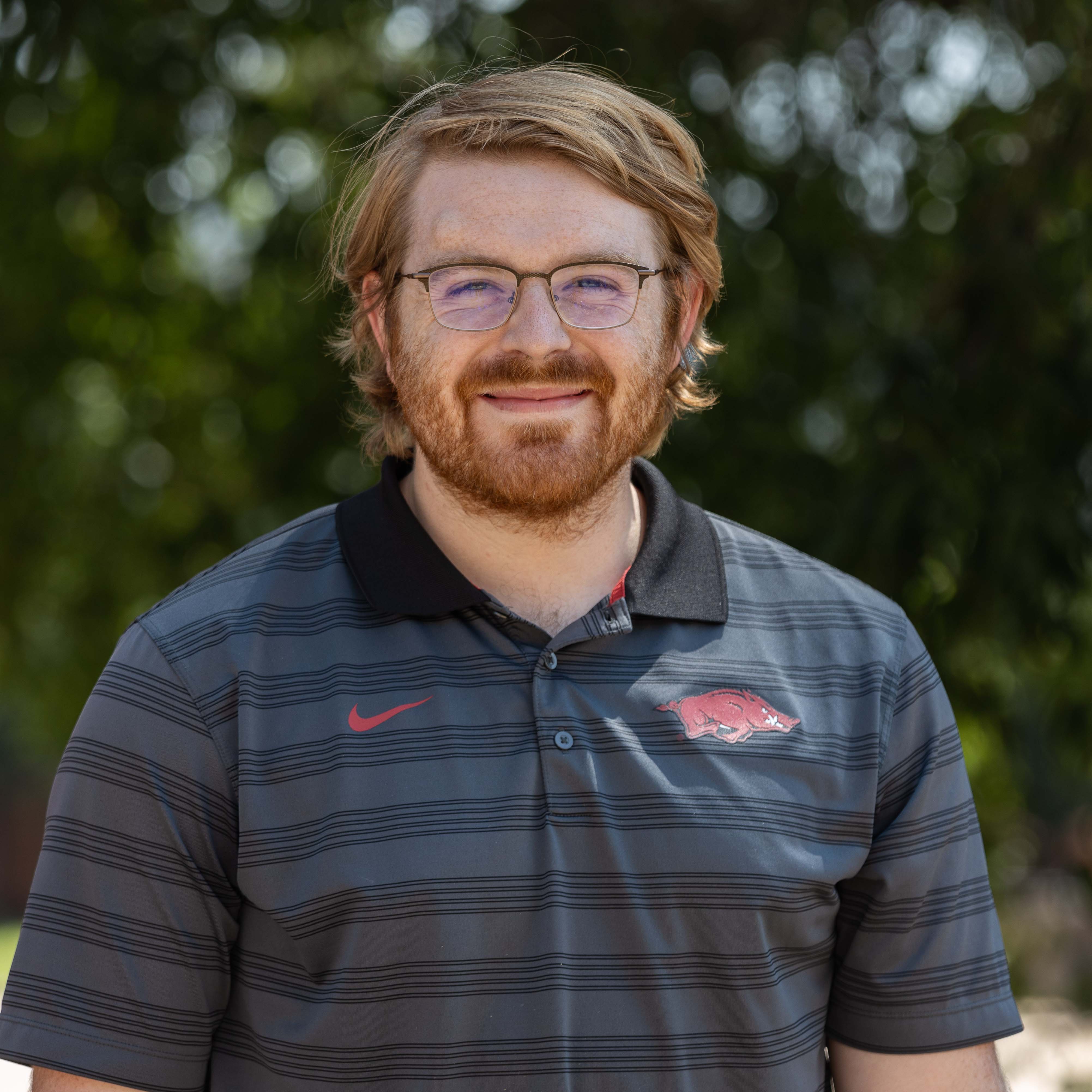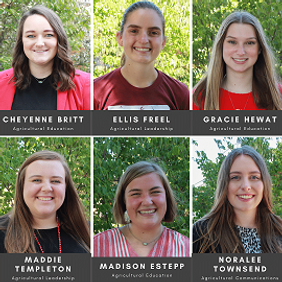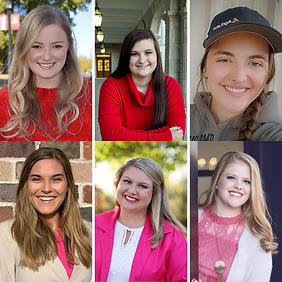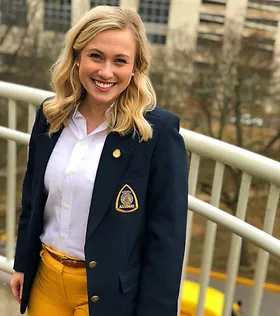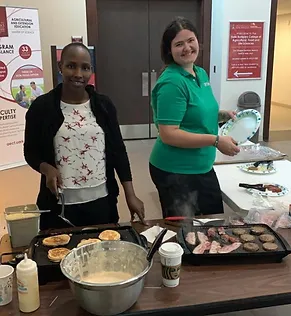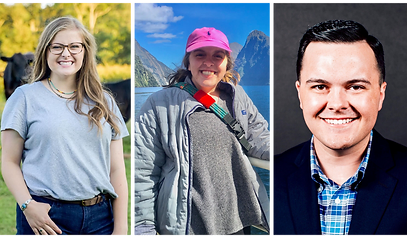Student Success Stories
Anna Mathis Encounters Tremendous Growth Through Study Abroad Experience at Rome Center
“Through my study abroad experience in Rome, I encountered tremendous personal and professional growth,” said Anna Mathis. “Studying abroad in Rome has broadened my understanding of the world, particularly food security issues and international development. It increased my cultural awareness and empathy by exposing me to other people's realities and global happenings.”
Anna Mathis, an AECT honors student and Truman Scholar, spent the Fall 2023 semester as a full-time student with a minor in global studies at the U of A campus in Rome, Italy. The Arkansas native was always interested in international relations and chose the U of A because of its study-abroad opportunities.
“During my sophomore year in high school, I attended the U of A for a meeting with AECT faculty, Drs. Cox and Miller, to prepare for my FFA public speaking competition,” said Mathis. “Their introduction to the agricultural communications program and study abroad opportunities at U of A piqued my interest to study at the university.”
While at the Rome Center, Mathis took courses such as Intro to International Relations, Global Changemakers, Western European Politics, Internship in International Relations, and a Roman culture class where she learned about Italian culture and language.
“Western European Politics was my best class, and my internship was my favorite part,” said Mathis. “It helped me understand what was happening politically and historically in Rome.”
Mathis interned with HummusTown, a catering company that hires and supports Syrian refugees seeking asylum in Italy. She assisted with communications work such as social media, graphics, photography, and videography and covered community service events. The other exciting part of her internship was providing customer services and learning Arabic and how to make their food while hanging out with people.
Mathis maintained a positive study balance while immersing herself in other adventures abroad, such as visiting eight countries, including Austria, Belgium, France, England, Scotland, the Czech Republic, Hungary, and Germany.
“Multitasking and turning travel into a classroom were my key approaches,” said Mathis. “Whether studying in coffee shops or airports, I utilized every location as a learning opportunity. Researching significant places, particularly in politics, such as Berlin during the Cold War, allowed me to connect my studies with real-life experiences.”
Mathis said the U of A scholarship supported her study abroad program and extra adventures. She received ten scholarships, including the Honors College Study Abroad, Gilman, and Richard Locke.
Mathis advises students considering studying abroad to be brave in all aspects of the process, from preparation to departure and return.
“Studying abroad helps you see the world differently; you're more informed and resilient,” said Mathis. “It puts you through intense growth experiences in a semester, and statistic has shown that you are more employable after studying abroad.”
This spring, Mathis was recognized as one of the 2024 honors graduates and the John W. White Outstanding Student at the Dale Bumpers College of Agriculture, Food and Life Sciences annual academic awards reception.
As a Truman Scholar, Mathis will participate in the Truman Foundation’s summer institution upon graduating this May. She plans to take a gap year directly after the summer to be a Truman Albright Fellow and apply to graduate schools.
AECT Graduate Student Awarded U of A Doctoral Academy Fellowship
Marcus Martin, an AECT doctoral student, was selected for one of the 40-45 highly competitive Doctoral Academy Fellowships — a university-wide grant available through the U of A graduate school.
The DAF is one of two competitive merit-based fellowships awarded to outstanding incoming doctoral students by the U of A graduate school.
Martin joined the department in August to pursue a Ph.D. in AECT with a concentration on agricultural leadership and a research interest in the lived experiences of first-generation female beef producers. His long-term goal is to work in higher education.
"I'm very passionate about inspiring and equipping the next generation of agriculturalists to recognize their purpose, find their place, and change the world," Martin said.
Martin graduated from Missouri State University with both a bachelor's and a master's degree. His undergraduate major shifted from agricultural communications to plant science before settling on ag business marketing and sales with a minor in Russian before furthering into a master's degree in agricultural economics.
Martin, who comes from a small-scale beef production background in which he recognizes, “how critical social sciences are to research and the discussion of agriculture” while reflecting on his journey in agriculture.
“I really loved everything involved in agriculture,” Marcus said. "But after engaging in the world of business economics, heavy statistics, heavy calc, I realized sometimes, we miss communicating the application aspects of research, and we miss the leadership potential our research brings to impact the future of agriculture.”
Qualified graduate students for DAF are nominated by their academic institutions or departments in addition to an offered graduate assistantship.
Martin’s graduate assistant duties include developing curriculum, assisting ag communications and leadership classes, assisting with the AYE livestock media, and working with his advisor, Assistant Professor Casandra Cox, on conducting leadership ethics research specifically within the confines of higher education.
“Thanks to the care of the AECT community, I truly believe I have found my place while being empowered to follow my passions. From our wonderful administrative team to our instructors and professors, to the legend that is our department head Dr. Wardlow, I have been supported, cared for, and positioned to explore and foster my passion for agriculture. You could not ask to be apart of a better team.”
As a DAF Fellow, Martin is required to maintain good academic and assistantship standing for a maximum of four years.
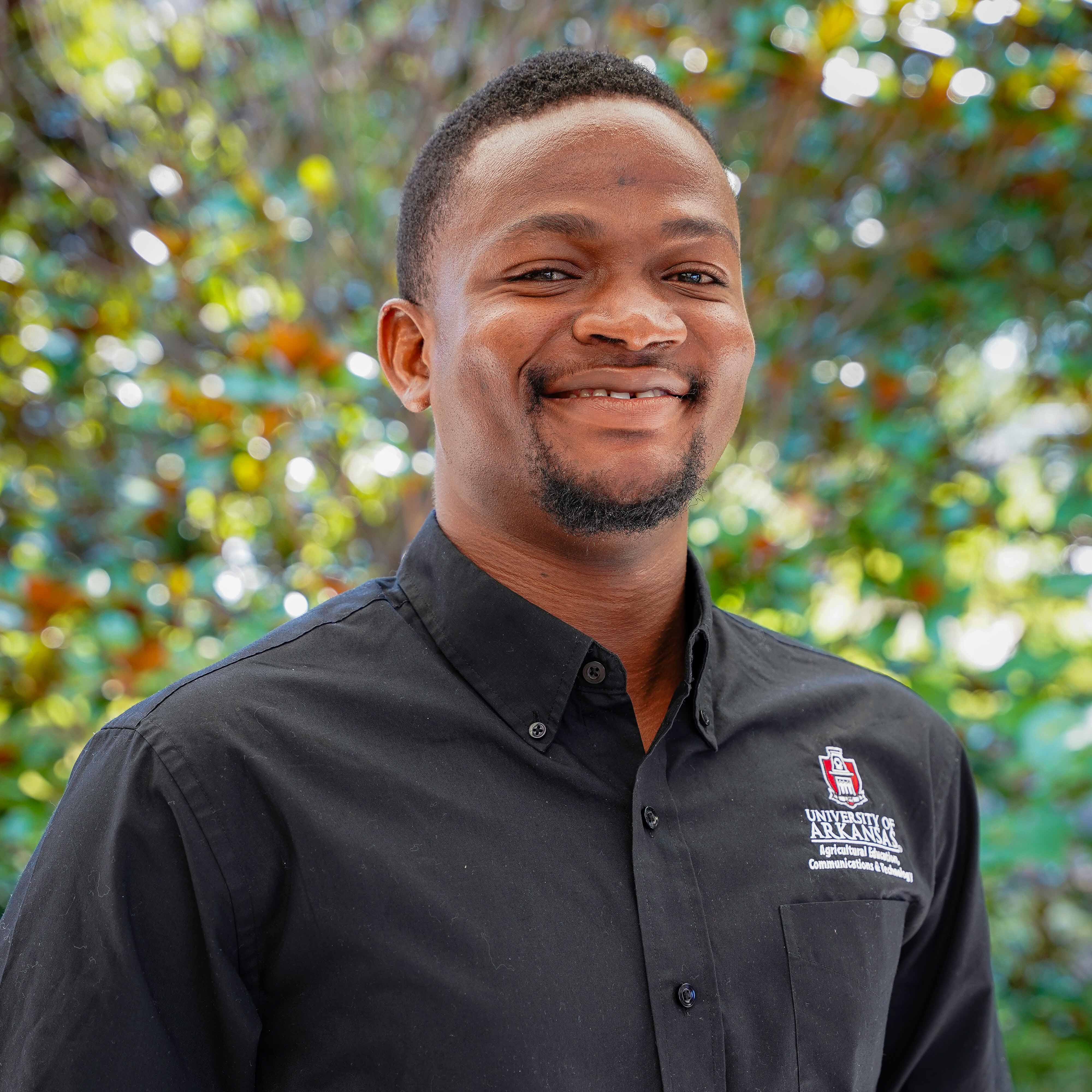
AECT Graduate student selected for FFAR Fellows Program
Enoch Teye Kwao Ametepey, a doctoral student in AECT, is the first-ever Bumpers College student to be a member of the Foundation for Food and Agriculture Research Fellowship program.
The FFAR Fellows Program was created by the College of Agriculture and Life Sciences at North Carolina State University and the Foundation for Food and Agriculture Research to provide professional development and career guidance to the next generation of food and agricultural scientists. It is designed for Ph.D. students studying areas of food and agriculture-related sciences in the U.S. and Canada.
Ametepey is a first-generation student from Ghana, West Africa, where he obtained both a bachelor's and master's degree at the University of Cape Coast. His bachelor’s degree focused on agricultural extension and community development, while his master’s was in agricultural extension.
Ametepey is pursuing his Ph.D. in AECT with emphasis in agricultural communications. His research is on the use of social media in science communication and strategies for combating misinformation among cooperative extension agents.
He was selected as one of the six fellows funded by the Rockey FFAR Fellows Fund. The fund honors Sally Rockey, the foundation's inaugural executive director.
“I am enthusiastic about being selected to participate in this fellowship because it gives me the opportunity to explore myself as a young scientist, connect with peers with like minds and also enhance my leadership, communication and networking skills,” Ametepey said. "I want to acknowledge and thank Dr. George Wardlow, Dr. Jefferson Miller and Dr. Jill Rucker for their support and contributions throughout the application process."
The 2023-2026 FFAR cohort attends five in-person meetings plus monthly virtual sessions. The cohort also creates and executes annual professional development plans and networks and establishes mentor-mentee relationships with industry scientists and others outside academia.
As part of the fellowship, Ametepey attended the Fellows Program kick-off — a one-week orientation session in August at North Carolina State University.
“Throughout the week, we were equipped with the keys to communicating science effectively to diverse audiences, strategies for engaging in crucial conversations, working as a team, and effective listening skills and strategies,” Ametepey said.
Ametepey aspires to secure a faculty position in agricultural extension and communications after his graduation.
Introducing the AECT REPS
The REPS team in the AECT department is hard at work this semester. The REPS team, led by instructor Hanna Estes, serves as departmental ambassadors who assist with new and transfer student recruitment efforts.
They have already hosted Canes & Games and have much more planned in the coming months for current and future students. The REPS team includes Cheyenne Britt, Ellis Freel, Emilee Block, Gracie Hewat, Madalyn Templeton, Madison Estepp and Noralee Townsend.
"My favorite part of being a REP has to be getting to plan events for our department," Hewat said.
She was attracted to the family-oriented community in the Bumpers College, and it allowed her to continue that tradition for current and future students.
"Like most students, this year I enjoy getting to be in person with fellow classmates," Hewat said. "We are finally able to plan events and activities for our students, and I love seeing the connections and friendships being made."
Estepp said the department has allowed her to continue her passion and love for agriculture by giving her opportunities to serve. She said her favorite part of being on the REPS team is connecting current students with incoming ones.
"I joined REPS because I love the AECT department," Estepp said. "I want to continue that tradition and being a REP for the department is a great way to do that!”
Estepp is a sophomore who started college during the pandemic, so her experience will serve her well as she works with the REPS team to plan and execute activities for students in the department.
"One thing I am looking forward to this year is being able to actually go to class and experience what being a college student actually is," Estepp said.
Throughout this academic year, the REPS team will work to get students involved in the AECT department and bring back the family-oriented atmosphere that was found in the department before the pandemic changed our world.
AECT Students Volunteer with Walton Webcasting at first Arkansas Youth Expo
Eight students from the University of Arkansas' Department of Agricultural Education, Communication and Technology interned with Walton Webcasting at the first Arkansas Youth Expo. McKayla Howard, Jessica Wesson, Sierra Burnett, Emilee Block, Dixie Miller, Ayden Massey, Will Hewitt, and Oakley Davis assisted Walton Webcasting broadcast the various livestock shows during the Arkansas Youth Expo (AYE).
Sierra Burnett, a junior agricultural communications major, said the opportunity was incredible. Not only did the students get video production experience, but Burnett said her favorite part was getting to see the producer side of video production.
“I loved getting to glance over the producer’s shoulder in our down time,” Burnett said. “Getting to watch him run the sound and manage multiple screens from the cameras was a great experience.”
Having no previous video experience, Burnett said she was nervous to take over the camera. She said the Walton Webcasting crew was eager to provide guidance and assist in any way possible.
“It was awesome to work with Walton Webcasting. They had headsets and radios to communicate with each of us throughout the day, so they could help us get the best angle for the camera or other tips. This really helped ease my nerves,” Burnett said.
On a volunteer basis, each intern got to choose which show to highlight, and they could switch with another intern to get experience in broadcasting multiple species during their shows. Burnett chose to stay in the cattle ring because that’s where her passion lies.
“I love livestock shows, but I also love to travel. It was really eye opening to have an inside view into an industry that specializes in both of these things! Honestly, this opportunity exposed me to an industry I would pursue as a career,” Burnett said.
Burnett said she was intrigued by the opportunity to combine her communications degree with livestock shows and traveling. She said a big part of her experience was due to the kindness of Walton Webcasting.
“Walton Webcasting was great,” Burnett said. “They were very pleasant to work with, great at providing positive feedback, and I really look forward to any opportunities that come up in the future with them.”
In addition to the video production experience, Burnett said the team and communication within that team was a great experience. She said there were a lot of great networking opportunities at AYE, but the interns also worked really well together.
“We got so good at communicating with the other interns. We really went the extra mile to assure everyone had what they needed and make sure shifts were covered,” Burnett said.
This practical learning experience was made possible by AFLS Dean, Deacue Fields, and was coordinated by Professor Jeff Miller, who co-advises the Agricultural Communicators of Tomorrow club.
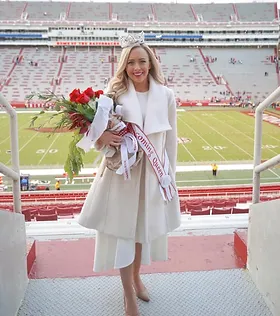
AECT Student Crowned Homecoming Queen
The University of Arkansas has a rich tradition of electing a few individuals each year to serve on the Homecoming Court. Registered Student Organizations can nominate up to three students to apply. The Agricultural Communicators of Tomorrow organization nominated Katie Gardner, who was named Homecoming Queen for 2020.
“After the initial application, the top 20 females and top 20 males were selected,” Gardner said. “We had to interview with a staff, faculty and alumni panel, and they narrowed it down to 12 of each.”
After a final interview, the top 7 males and females were selected to serve on the Homecoming Court. Students across the University of Arkansas campus then voted on these individuals to select the queen and king. The process can be challenging, especially through COVID-19.
“Everything was virtual up until the very end. The announcement was in-person with a limited attendance,” Gardner said. “In past years, the candidates would have more face-to-face interactions with the campus at various events, but this year our campaigns took place almost entirely on social media and video calls.”
Homecoming is a longstanding staple on the Hill. It’s a recognizable tradition that will always have a place at the U of A. “It reminds us why we chose Arkansas to begin with, and how we continue to be a Razorback each day,” Gardner said. “Traditions of community, legacies and pride in bonds that connect us continue when the events, decorations and physical celebrations don’t. The U of A is a special place, and Homecoming is an opportunity to reminisce the place we will always be able to call home.”
Gardner has been a member of ACT, her sponsor organization, since she was a freshman. “It was special to me to represent our club and its members in the Homecoming process,” Gardner said. “I could not and would not be here without the support of my family of friends and amazing advisors.”
As an agricultural communications and agricultural business double major, she also represented the Bumpers College.
“Bumpers will always hold a special place in my heart, because that’s where I found my home on campus,” Gardner said. “We may be a smaller college, but we are capable of doing big things together.”
Gardner said that the best part of the process was being able to celebrate with her family and friends when the announcement was made.
“I was allowed to bring three members from my RSO along with a few family members to a socially distanced and masked pep-rally in the Greek Theatre,” Gardner said. “When my name was announced, I could hear them cheering so loud and running to them afterward for hugs was so exciting. The best part was getting to share it with the friends and family who have consistently been by my side for the past 3.5 years, encouraging me every step of the way.”
This accomplishment is something she’s honored to share with others that have come before her.
“Being named Homecoming Queen was incredibly exciting, and it’s such an honor to represent the University of Arkansas in this special celebration,” Gardner said. “Past Homecoming Queens, including some of AECT’s own, have been women that I’ve looked up to as leaders and role models on campus, so sharing the title with them is very special.”
The process of running for Homecoming Queen may seem daunting, but that doesn't mean that you won’t succeed.
“There is a support network here in AECT that will always have your back and help with prepping for applications and interviews,” Gardner said. “The process allows you to showcase your accomplishments and commitment to campus involvement, so look at it as an opportunity to tell your story and why you are proud to be a Razorback.”
ACT also nominated Alison Creasey for the Homecoming process. She was in the top 12 finalists for Homecoming Court. Creasey is a senior majoring in agricultural communications.
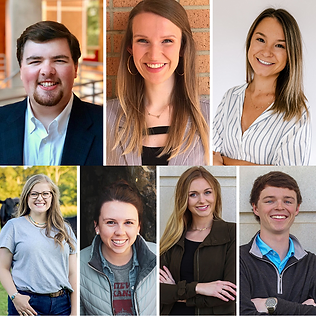
Seven ACOM Students Honored by National ACT
Seven students from the University of Arkansas' Department of Agricultural Education, Communication and Technology were honored virtually for their accomplishments in the National Agricultural Communicators of Tomorrow during the organization's annual business meeting. Kenley Bramall, Alison Creasey, Macie Kelly, Laykyn Rainbolt, Graham Smithson, Ashlyn Ussery and Ashton Williams were recognized for winning various titles in the communications contest hosted by the NACT. In total the group brought home 11 awards.
Bramall, a recent graduate, received the Public Relations Award of Excellence — which is one of the highest honors for the national contest.
"It's an incredible honor to have received this division award," Bramall said. "I wholeheartedly believe that my instructors at the University of Arkansas prepared me for this, and I owe it all to them and my department!"
Zachary Andrews, a junior in the AECT department, was elected as the National ACT member relations coordinator. He is excited to serve as a national officer for the first time.
"It's a huge honor to have been elected to serve NACT," Andrews said. "I am both humbled and excited to spend the next year working with all of the forward-looking, passionate and innovative agriculturalists that make up National Agricultural Communicators of Tomorrow."
The business meeting was held virtually this year due to COVID-19 restrictions, and students from around the country attended the zoom session to conduct business as an organization.
Below is a list of the awards that each student won:
Kenley Bramall – Public Relations Award of Excellence, 1st place in Public Relations Single Item, 3rd place in Public Relations Campaign
Alison Creasey – 1st place in Newsletter
Macie Kelly – 1st place in Newsletter, 3rd place in Logo Design
Laykyn Rainbolt – 1st place in Newsletter, 1st place in Logo Design
Graham Smithson – 1st place in Newsletter
Ashlyn Ussery – 3rd place in Black and White Photo
Ashton Williams – 3rd place in Animal Photo
Kelly Serves in National FFA Convention Backstage Crew
Macie Kelly, a senior studying Agricultural Communications, was among a special group of people at the 92nd National FFA Convention and Expo. She was selected to serve in the backstage crew.
“We were there the entirety of convention,” Kelly said, “from setup to teardown. We organized the backstage flow, created a space for national officers to relax, and mostly just made sure the whole event ran smoothly.”
The crew’s jobs went beyond general sessions. They were present for every practice and run through that took place, which required hours of preparation and work. Kelly said part of her specific job was to ensure camera angles were correct, to double-check the marked places on stage, and to confirm the precise timing of everyone involved.
“On the busier days, where there are two or three sessions a day. It was a madhouse,” Kelly said. “I remember running around grabbing seating cards, making sure people were in the right spot, and checking everything. We still had to make sure we did our jobs to avoid any unforeseen hiccups.”
One element of working backstage did rise to the top of the list for her. One of the colossal moments at National FFA Convention is the election of the new national officer team. Members wait for this all week to see if their state’s candidate will make the cut.
Six students are chosen to serve a twelve-month term representing the National FFA Organization. Once they are installed the new officers are rushed backstage, where they disappear for a time. After their name is announced a backstage crew member is assigned to them. That crew member’s job is to keep track of their officer and guide them through the next steps.
“The crew is briefed about our job, but the officers usually don’t know we are there to escort them,” Kelly said “We stayed very close to them as they celebrated for about five minutes with their friends and families backstage. We whisked them away to their immediate training and press appearances.”
As Kelly reflected on her latest National FFA Convention experience as one of service, she described her love for the organization that gave her so much. This year gave her a chance to give back in a way she never has before. It also allowed her to bring new knowledge back to Arkansas FFA for future reference.
“This is Arkansas FFA’s third year to be in the Hot Springs Convention Center,” Kelly said, “which gives us huge potential to grow. It’s important to have more people who know the inner workings of an FFA convention. This year’s backstage experience taught me more about how to make it more efficient behind the scenes.”
UA AECT Creates Collegiate 4-H Club
The University of Arkansas is now home to a Collegiate 4- H Club, the first club solely devoted to 4-H the University has ever had. Sagely Burnett, a sophomore student Agricultural Business major, played a key role in the establishment of this club.
“I decided to start the Collegiate 4-H because of my long involvement with the youth organization,” said Burnett. Burnett was helped greatly by Reagan Grubbs, a previous Arkansas 4-H State Officer and graduate student at the U of A.
“Ever since I was within the youth organization as a child, I knew I wanted to continue my 4-H abilities past youth membership,” said Grubbs.
Grubbs said after she aged out of the youth organization, she made it her personal mission to create a Collegiate 4-H Club for alumni of the organization so they could continue their 4-H participation outside of high school. 4-H is so popular as a youth organization because of the endless possibilities for projects, said Burnett.
There is a category for almost any area of interest within 4-H, but there are also certain leadership skills that are taught in 4-H programs no matter what the project area.
“Most of the opportunities within Collegiate 4-H or within any 4-H club revolve around personal development,” said Burnett, “mostly with professional development, community service, leadership, as well as the opportunity to teach and mentor younger 4-H members.”
Burnett said she plans to implement these development skills into as many areas of Collegiate 4-H as she can. The Collegiate 4-H Club holds many of the same goals that County 4-H Clubs do in the state.
“A goal that is very important to us is making our members feel secure in their abilities in the real world,” said Burnett. Grubbs said the club is run by the members.
“The goal for this club is to allow our members to personally and professionally grow in ways they feel they need in order to succeed,” said Grubbs.
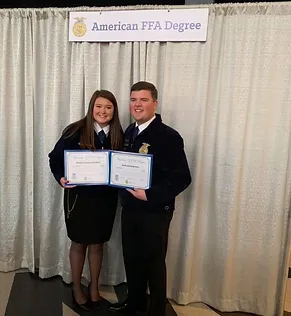
AECT Students Reach the Gold Standard
Four AECT students were recipients of the National FFA American Degree at the 92nd National Convention and Expo. Zach Andrews, Braden Bateman, Dixie Miller, and Megan Morris applied for their American FFA Degrees in March, completing a challenging application process.
The American FFA Degree is the highest degree honored to any member in the organization. In order to have received this degree, members must have previously received a State Degree, completed at least 540 hours of agricultural education courses, maintained a project valued above $10,000 dollars, and served a minimum of 50 service hours.
Andrews is a sophomore at the University studying Agricultural Communications.
“The American degree is the capstone to your FFA career. After years of hard work you get to wrap it up in a nice bow,” said Andrews. “It’s super cool to be a part of the small percentage of members that receive this award.”
For Andrews, receiving the American FFA Degree also held another significance.
“I am the third person in my family to receive it -- my mother received hers when she was a member, and my brother received his at the end of his time in the FFA,” said Andrews. “That made it really special to carry on that family tradition.”
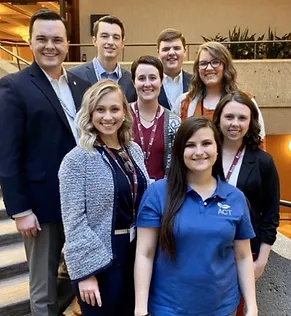
UA ACT Travels to NACT PDC in Kansas City
The University of Arkansas Agricultural Communicators of Tomorrow (ACT) club took eight students and one advisor to the National ACT Professional Development Conference (PDC) in Kansas City, Missouri November 12-15.
Macie Kelly, a senior majoring in agricultural communications, is a member of the University of Arkansas ACT chapter. Kelly has been to PDC before, so she returned as a veteran. PDC was held in conjunction with the National Association of Farm Broadcasting (NAFB) Convention for a second year.
“It was a really good opportunity to interact with industry professionals, especially because of the new partnership with NAFB,” Kelly said. “It's just always a good situation when you're putting college students in front of industry professionals and having them learn from experiences like that.”
She said there were several highlights of PDC that enhanced her overall experience. One of those was learning about careers in agricultural communications.
“As a senior in college about to graduate,” Kelly said, “I was excited to learn about job opportunities that are opening for someone like me who has a passion for the industry.”
Ashlyn Ussery, a first-year graduate student in Agricultural and Extension Education, attended PDC as well. Ussery graduated from Southern Arkansas University with a bachelor’s in Agribusiness, and this was her first experience with NACT.
“I really enjoyed the atmosphere and getting to see people from all over the U.S. coming together,” Ussery said. Her favorite part was getting to chat with industry professionals.
“I loved the speed networking,” Ussery said. “I heard about opportunities with companies that represented different parts of agriculture. Ussery said all ACT members should consider attending the next conference.
“Students need to know that agricultural communications is a wide genre of work,” Ussery said. “Conferences like PDC help students learn about different career paths they can take in the industry they love.”
AECT Students Attend National FFA Convention
AECT students attended the National FFA Convention Oct. 30 through Nov. 2 in Indianapolis, Indiana. The FFA Alumni and Supporters club attended National FFA Convention, along with students in the AECT department completing internships and recruiting for the University of Arkansas.
Will Clark, an AEED graduate student, worked as a part of the backstage and arena crew. Clark said he began the week by setting up the seating, stage props, and crew and national officer locker rooms. During convention sessions, Clark’s role was to move the lectern on and off stage, manage props, and ensure members were prepped to go on stage and that all seating cards were collected for the announcer to read from.
“I applied many skills learned from the AECT department at National Convention such as time management, organization, and delegation,” Clark said. “Further, leadership was required when creating the absolute best student experiences all the way in the crowd and during many students' time backstage.”
Kelby Biswell, an undergraduate agricultural communications student, attended National FFA Convention with the FFA Alumni and Supporters. Biswell said the group volunteered at the National Floriculture FFA CDE and the Dale Bumpers College booth.
“I had previously competed in the National Floriculture FFA CDE, so I was familiar with and was excited about the contest! This was my fourth year at National FFA Convention, so I possessed skills to navigate the convention,” Biswell said.
Kenley Bramall, a senior in the AECT department who also serves as the Bumpers College Lead Ambassador, attended National FFA Convention. Bramall recruited FFA members on a national level to attend Bumpers College and the AECT Department.
“My public speaking skills allowed me to effectively execute college recruitment at national level,” Bramall said.

